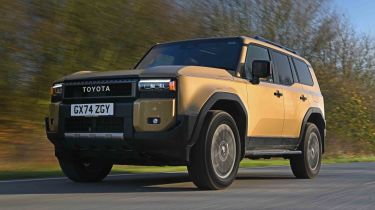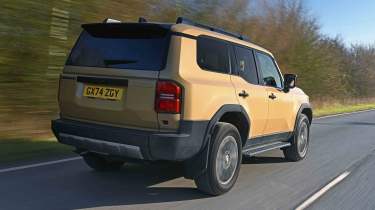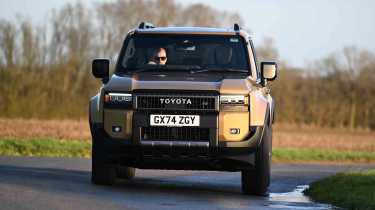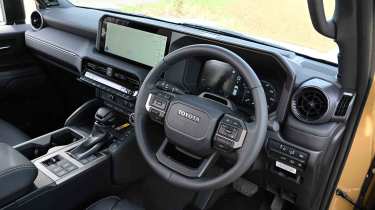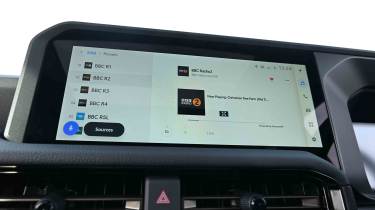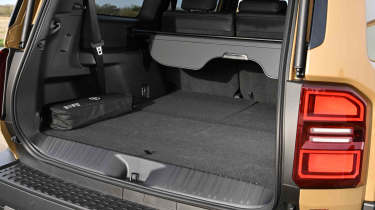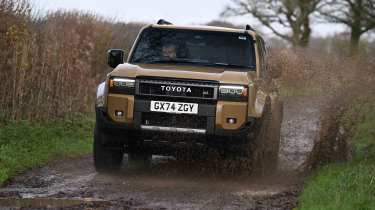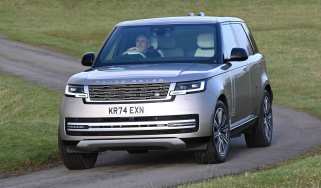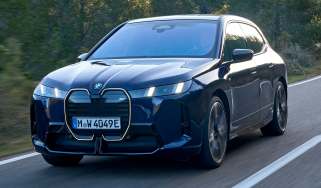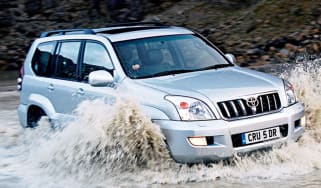Toyota Land Cruiser review
The retro looks of the Toyota Land Cruiser mask a new platform and contemporary technology for the long-running nameplate

Is the Toyota Land Cruiser a good car?
For those in the know about 4x4s, the Toyota Land Cruiser is seen as a dependable go-anywhere vehicle that offers fantastic off-road capability that many owners will hardly ever tap into. The latest model injects some distinctive style to the mix, with its retro-inspired lines and colours. Inside, the seven-seat cabin isn’t the most intuitive layout we’ve come across, but the Land Cruiser is well equipped and its off-road ability doesn’t come at the expense of on-road manners, where it’s just as easy to drive as any other Toyota model. In the UK the Land Cruiser seems expensive, especially when you consider that it’s powered by a relatively weak and noisy four-cylinder diesel.
| Key specs | |
| Fuel type | Diesel |
| Body style | Five-door SUV |
| Powertrain | 2.8-litre four-cylinder turbodiesel, eight-speed automatic gearbox, four-wheel drive |
| Safety | Not yet tested by Euro NCAP |
| Warranty | Three years/60,000 miles (up to 10yrs/100,000 miles if serviced at a Toyota dealer) |
How much does the Toyota Land Cruiser cost?
After a brief hiatus, the Toyota Land Cruiser has returned to the firm’s line-up. It brings with it some retro-modern design for the exterior, while inside there’s a seven-seat layout and lots of technology, as well as a new platform underneath. It’s the most expensive car in the current Toyota range, with a price tag of £75,000 that places it firmly in Lexus territory.
There are just two versions of the Land Cruiser available at launch: the Invincible and the First Edition, the latter of which has a price tag that’s £5,000 higher. The visible differences between them include larger 18-inch wheels, two-tone paint and unique detailing for the First Edition, plus round daytime running lights with auto main beam instead of the Invincible’s adaptive system with square-shaped main units. The First Edition is likely to be hard to find in the UK, because the initial allocation of Land Cruisers sold out quickly.
Used - available now

2016 Toyota
Land Cruiser
36,008 milesAutomaticDiesel2.8L
Cash £37,300
2021 Toyota
Land Cruiser
30,638 milesAutomaticDiesel2.8L
Cash £53,990
2014 Toyota
Land Cruiser
72,123 milesAutomaticDiesel3.0L
Cash £26,490
2021 Toyota
Land Cruiser
14,212 milesAutomaticDiesel2.8L
Cash £40,450Power for the Land Cruiser in the UK comes from a 210bhp 2.8-litre four-cylinder turbodiesel that’s sourced from the Toyota Hilux pick-up truck. This is paired with an eight-speed automatic gearbox with a low-range transfer case – selected via a button on the dashboard – while a Torsen centre differential and rear electronic diff lock are fitted to help with the car’s off-road ability.
Land Cruiser history
The Toyota Land Cruiser is one of the staples of the Japanese firm’s line-up, having been produced since the 1950s. The original Land Cruiser copied a template created by the original Willys Jeep, but over time it has evolved into a station wagon over six generations, adding luxuries and refinement to the mix with each new model.
The latest UK-market Land Cruiser is known internally at Toyota by the J250 model code, because there’s a larger J300 Land Cruiser available in other territories. Where both models are sold side by side, the smaller version adds the Prado suffix.
The two models are based on the same platform, but the J300 is slightly larger, has more contemporary styling and only comes with V6 petrol or diesel engines. In the US, the smaller J250 is the only Toyota Land Cruiser that’s sold there, while the larger J300 model is sold as the Lexus LX.
Engines, performance & drive
The latest Land Cruiser’s platform is new to the UK, but it’s a proven set-up borrowed from the Tacoma and Tundra pick-up trucks sold in North America. Body-on-frame construction ensures the kind of off-road ability that the Land Cruiser is famous for, and it features double-wishbone suspension up front and a four-link system at the rear, with a lateral control arm to boost stability.
While the chassis is new, the UK-spec Land Cruiser features the same large-capacity 2.8-litre four-cylinder diesel used in the last model, and is also found in the Hilux pick-up. Power is rated at 202bhp and 500Nm of torque, available across a very wide rev range, with peak torque coming in at just 1,600rpm. There’s impressive responsiveness at low revs and very little turbo lag. The transmission does its part to keep the engine on the boil, and itself makes quick, decisive gearchanges.
A kerbweight of 2,335kg is a lot for the engine to haul around, and the Land Cruiser has a 0-62mph time of 10.9 seconds, which is behind similarly priced versions of the Land Rover Defender and Ineos Grenadier, because they feature punchier six-cylinder powerplants.
Drive is sent through an eight-speed automatic gearbox to a permanent four-wheel drive system, with high and low-range gears. There’s a centre Torsen diff to manage power distribution and an electronic rear diff lock that helps boost traction when grip is low, while the detachable anti-roll bar is designed to help when driving off road. Electronic assistance comes in the form of hill start and downhill assist, crawl control that maintains a set speed so you can concentrate on steering, and Multi Terrain that sets up the car’s electronic systems for different conditions.
Land Cruiser on road
There’s no hiding the fact this off-roader has been designed to conquer off-road situations. The steering has a slow rack, and even on the smaller 18-inch wheels there’s a patter to the ride at low speeds it can’t quite fully isolate. You won’t, for instance, feel this in a Land Rover Defender with its optional air springs, and even at higher speeds, where the Toyota does improve significantly. It just can’t quite match a Defender’s near luxury-car levels of passenger comfort.
At just under five metres long, the Toyota Land Cruiser is a big car to drive in town. However, relatively light steering and a panoramic 360-degree camera system help you to place it accurately, and the tall driving position gives you a clear view of your surroundings. There’s a firm edge to the ride when driving at lower speeds, while the diesel engine isn’t the most pleasant-sounding thing when you’re accelerating in town.
The ride smoothes out the faster you go, while the engine settles down to a low hum as the gearbox short-shifts through the ratios. Toyota has added Sport and Eco driving modes, and selecting the former sharpens the powertrain’s responses and helps the car feel surprisingly lively, considering its size and weight.
The brakes do a good job of bringing the Land Cruiser to a halt, with good feel through the pedal, while the steering is positive, but a little on the slow side. It will be the car’s high centre of gravity that is the main factor in preventing you from pushing it any harder. But grip is good from the four-wheel-drive system, so you need to be pushing beyond what is comfortable to cause any upset.
There’s enough power to reach the national limit before the end of a slip road, although it will be accompanied by a harsh diesel rattle from under the bonnet. However, once up to speed, the engine settles down and road and wind noise take over. This isn’t too bad, though, and the Land Cruiser is a decent long-distance companion.
Land Cruiser off road
Head for the wilds, and the Land Cruiser shouldn’t let you down, although it might not be able to head as far into the rough as some rivals. There’s a central Torsen differential to send power to the corner with the most grip (or can be locked in a 50:50 split), but the rear diff lock is an electronic system that reacts to wheel slip, rather than engaging permanently before grip is lost – some off-road enthusiasts prefer this kind of set-up.
Ground clearance and a long wheelbase will limit some of the Land Cruiser’s ability, too, with 215mm of clearance and a 2.8-metre wheelbase restricting the car’s breakover angle. The rear overhang is a bit of a limiting factor as well, with a departure angle of 17 degrees being around half the figure quoted for an Ineos Grenadier, for example.
Another factor that will affect performance off the beaten track will be tyres. While rivals such Ineos and Land Rover offer all-terrain rubber as an option, you’ll have to visit a fitter to replace the road-biased cross-terrain tyres on the Land Cruiser. Thanks to the car’s global popularity, the aftermarket will be able to offer plenty of off-road upgrades, such as snorkels, storage racks and additional lighting.
| Model | Power | 0-62mph | Top speed |
| Land Cruiser 250 (18in wheels) | 202bhp | 10.9 seconds | 102mph |
| Land Cruiser 250 (20in wheels) | 202bhp | 10.9 seconds | 105mph |
MPG, emissions & running costs
A large-capacity four-cylinder diesel connected to an automatic gearbox and permanent four-wheel drive system isn’t going to be particularly efficient. Engine stop-start is standard, but an official fuel economy figure of 26.4mpg is pretty poor.
During our time with the Land Cruiser we managed 29.8mpg, thanks in part to a number of miles spent cruising on the motorway. When combined with the Toyota’s 80-litre fuel tank, that means there’s a range of more than 500 miles on offer.
High emissions and a £75,000 list price mean it’s not just fuel that requires an extensive outlay. Road tax is £600 for the first five years, while Benefit-in-Kind costs are north of £10,000 for 40 per cent taxpayers.
UK Land Cruisers get a three-year warranty as standard, but Toyota lets you extend this to 10 years/100,000 miles if you keep returning to Toyota for your servicing, and this should give you some peace of mind that the Land Cruiser is built to last.
Insurance is unlikely to be cheap given that the Land Cruiser has a group 48 rating, which is two away from the highest category, although that’s par for the course for cars at this price point.
One appealing number is the Land Cruiser’s residual value, which at 64 per cent makes it one of the best performers in the whole new-car market. That can be put down in part to the car’s freshness and limited availability, but is still impressive nonetheless.
| Model | MPG | CO2 | Insurance group |
| Land Cruiser 2.8 D-4D Invincible | 26.4mpg | 280g/km | 48 |
Design, interior & technology
Visually, the latest Land Cruiser references the ‘J60’ Land Cruiser of the 1980s, with squared-off styling that hasn’t been seen for a few generations, but there are hints too of the ‘J70’ – a separate model wearing the Land Cruiser nameplate that was also launched in the 1980s, but is still in production in some markets. It’s not the first retro-inspired shape we’ve seen in recent years, but it’s another successful reinterpretation of a much-loved model from the past.
Retro lines might be the order of the day on the outside, but the cabin goes for a more modern look that has a definite chunky theme. There’s an upright, squared-off instrument pod, and large circular air vents at either end of the dashboard.
The cabin combines hard-wearing surfaces with a smattering of elegant materials to create a sense of total solidity. In fact, the entire cabin feels almost infallible as there is barely the tiniest creak or rattle, even when articulated over an obstacle with a wheel dangling two feet in the air.
As is common with modern Toyotas, there are plenty of buttons and labels across the dash, including individual climate controls that are separate from the main touchscreen. The controls for all of the Land Cruiser’s off-road functions are clustered next to the drive selector, with additional information available on the main touchscreen.
The switchgear has a familiar feel, so it works with precision, while the chunky seat mechanisms feel robust, especially when changing the configuration in the back.
Sat-nav, stereo and infotainment
Toyota has kept things simple with the infotainment system. The large 12.3-inch touchscreen is joined by a similarly sized dashboard cluster. Some manufacturers make a point of joining these screens for one sweeping display, but in the Land Cruiser the dials are deeply recessed to help mitigate reflections and look like regular instruments. Electronic control for the 4x4 functions helps to free up space on the dashboard for cup-holders and storage.
The main touchscreen is supplemented by buttons and knobs that allow you to operate some functions by feel and a quick glance, rather than staring at a screen. Notably, the air conditioning, seat heating and seat cooling controls are all physical switches. Driving modes likewise, with a rotating knob near the gear selector, and while most audio controls are through the touchscreen, you still get buttons on the steering wheel and a volume knob on the dash.
The 12.3-inch touchscreen is standard Toyota fare, using the brand’s Smart Connect+ media interface, which many owners will barely interact with since Apple CarPlay and Android Auto integration is standard. Smart Connect+ does have a native navigation system, though, and sends sound through a 14-speaker JBL audio set-up in all variants. There’s a wireless charging pad for a phone, too, although Toyota has provided plenty of USB-C ports for charging various devices whether you’re popping to the shops or are out in the wilderness.
Boot space, comfort & practicality
Large, boxy dimensions mean that the Toyota Land Cruiser can’t help but offer generous space inside, which is enhanced by the standard-fit seven-seat layout.
The upright dash puts all of the controls close to the driver, and the physical buttons help aid user-friendliness. There’s a wide range of seat and wheel adjustment, and a tall driving position that gives a good view ahead. The glovebox is small, though, and the armrest bin is restricted because it features a coolbox function.
The back doors are a little narrow for such a large car, so access isn’t brilliant. Inside you’ll find a high seating position with lots of elbow room, but it will have taller occupants brushing the headlining. The third row is only really for kids or small adults, with limited legroom on offer. Getting to those seats can be awkward because the middle row just tumbles forward and doesn’t slide to boost access. The backs of the middle seats can be reclined or set upright to make a bit more space in the back.
There’s a limited 130 litres of boot space available in seven-seat mode, but this grows to 620 litres when the rearmost seats are folded flat into the floor. A maximum capacity of 2,000 litres is offered with the middle row tumbled forwards. You also need to tether the seats in place using the built-in straps to stop them falling back down.
The tailgate is large, but to help with access in tight spots the Land Cruiser’s tailgate glass opens separately, allowing you to quickly load smaller items.
The Land Cruiser will be a perfect tow vehicle, with that torquey diesel providing lots of pulling power from as little as 1,600rpm, while trailer sway control is part of the car’s electronic stability control. A maximum towing capacity of 3.5 tonnes is offered, while Toyota has a range of fixed and detachable towbars available on the accessories list.
| Dimensions | |
| Length | 4,925mm |
| Width | 1,980mm |
| Height | 1,935mm |
| Number of seats | 7 |
| Boot space | 130-2,000 litres |
Safety & reliability
The Land Cruiser is a relatively low-volume seller, so it’s unlikely that Euro NCAP will run it through its safety assessment programme. But there shouldn’t be much to worry about, because Toyota Safety Sense is standard. This system features on lots of other five-star-rated Toyotas, and includes adaptive cruise control, road-sign recognition, lane-departure warning and a pre-collision system among its tech.
Toyota has a decent record in our Driver Power surveys, with owners praising their cars for reliability and dependability. The firm finished eighth (out of 32) in the 2024 survey, which is lower than in some past polls.
The Land Cruiser has a three-year/60,000-mile warranty from new. This can be extended to 10 years or 100,000 miles (whichever comes sooner) if annual servicing is carried out at an official Toyota dealer. Roadside assistance is only available for the first 12 months, but Toyota’s strong reputation for reliability, the chances of breaking down are likely to be slim.
Prices for Land Cruiser maintenance are still to be confirmed, but Toyota will offer a plan that lets you pay monthly. Intervals are every year or 10,000 miles, whichever comes first.
| Key standard safety features | Euro NCAP safety ratings |
|
|
Toyota Land Cruiser alternatives
The latest Toyota Land Cruiser is a serious 4x4, and has some serious rivals. The most obvious is the £56k-and-up Land Rover Defender, which, while it isn’t as basic as its predecessor (while the Land Cruiser has, if anything, gone the other way), is still a proper off-roader. There are more options in the line-up, with three different body lengths (90, 110, and 130) as well as four, six, and eight-cylinder engines, and a mix of petrol, hybrid, and diesel, to the Toyota’s sole four-cylinder diesel.
Next up is the car that, for some, has replaced the old Defender, the Ineos Grenadier. It has a few different body options, including the Ineos Grenadier Quartermaster pick-up, and a choice of two BMW six-cylinder engines, one petrol and one diesel. It’s designed to match the Toyota off-road and starts at a similar price of £72,000, but the Grenadier has compromised on-road ability that will limit its appeal with SUV buyers. It can’t be faulted for its off-road ability, though, with triple diff locks and masses of ground clearance giving it a distinct advantage over nearly every rival.
Finally, the Mercedes G-Class is similar to the Toyota and Land Rover in that it has a long heritage and a no-nonsense attitude. However, while it’s still incredibly capable as an off-roader, it’s certainly aimed more at those who appreciate its image rather than those who enjoy spending their days driving over rough terrain. It’s expensive, with prices that are double those for the Land Cruiser.
Frequently Asked Questions
Just like the rest of the Toyota line-up, the Land Cruiser has a three-year/60,000-mile warranty as standard, but this can be extended to 10 years or 100,000 miles with annual servicing at approved Toyota franchises.
